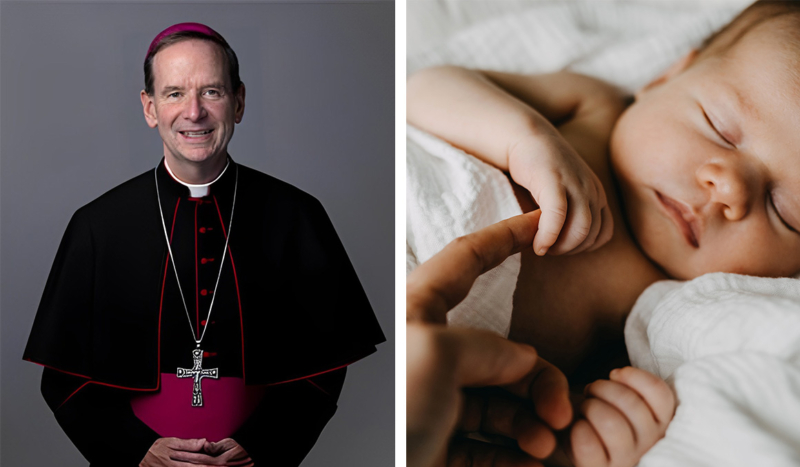
Bishop Michael F. Burbidge / Diocese of Arlington (Left)
CV NEWS FEED // Bishop Michael Burbidge of Arlington, Virginia, in a Feb. 19 statement expressed disappointment regarding President Donald Trump’s executive order that supports in vitro fertilization and called on elected officials to support families in better ways.
“‘Expanding access’ to IVF as described in this executive order is likely to unjustly promote IVF in a way that will result in the abandonment or death of millions of embryonic human persons, involve all taxpayers with a serious moral injustice, provide federal subsidies for already lucrative IVF businesses, and ignore the risks to parents and children of America’s broadly unregulated IVF industry,” the bishop said in the statement.
Trump’s “Expanding Access to In Vitro Fertilization” executive order, released Feb. 18, called on Assistant to the President for Domestic Policy Vince Haley to make recommendations within the next three months regarding how to pursue “protecting IVF access and aggressively reducing out-of-pocket and health plan costs for IVF treatment.”
“My Administration recognizes the importance of family formation, and as a Nation, our public policy must make it easier for loving and longing mothers and fathers to have children,” the executive order states. “In vitro fertilization (IVF) offers hope to men and women experiencing fertility challenges.
“Americans need reliable access to IVF and more affordable treatment options, as the cost per cycle can range from $12,000 to $25,000. Providing support, awareness, and access to affordable fertility treatments can help these families navigate their path to parenthood with hope and confidence.”
Bishop Burbidge said that the president is contradicting himself.
“In practice and principle, IVF is incompatible with the president’s evident support for the good of human life and his desire to encourage family formation,” the bishop said.
Last month, the bishop published a pastoral letter regarding IVF, aiming to encourage and teach people about the morality of this fertility treatment. The letter, titled “The Christian Family, In Vitro Fertilization, and Heroic Witness to True Love,” described the unfulfilled desire many couples experience of having a child and why IVF is not a good solution.
“For every one of the more than 12 million children born by means of IVF since 1978, there are many tens of millions more missing brothers and sisters who have been either deliberately destroyed, experimented upon, or frozen in liquid nitrogen and denied their natural right to the fullness of their development,” the bishop wrote. “Every successful IVF procedure results in a living child with many missing siblings.”
Even if those siblings were not ill-treated or abandoned, “the natural and loving embrace of man and woman expressed in marital love” is swapped for a lab procedure.
“IVF subverts human dignity by reducing human persons—man, woman, and child alike—into objects of a technical process that threatens what the Holy Father has described as ‘the human being in his or her irreducible specificity,’” the bishop wrote.
IVF also automatically separates children from their natural parents, he noted. Also, the limited regulations in the industry make it dangerous for children and parents. He encouraged elected officials to add health and safety regulations, such as requiring informed consent disclosures that explain IVF’s consequences and the other options couples have. Some European countries limit the number of embryonic children per procedure.
“The Church stands in solidarity with all those experiencing infertility and proclaims the dignity of all who come into existence as a result of IVF; however, she stands absolutely opposed to any federal or state governmental action that would involve every citizen with a grave moral injustice,” the bishop wrote.
In his Feb. 19 statement, Bishop Burbidge urged the president and other lawmakers to choose to take actions that actually support families and human life instead of harming them and forcing taxpayers to support IVF.
“The Church recognizes that the state has a moral responsibility to support the good of the family,” the bishop wrote. “Elected officials should consider concrete ways to encourage earlier marriage and family formation, establish programs to address direct pregnancy and childbirth-related expenses that may act as a barrier to the growth of families, and expand coverage for life-affirming and restorative fertility care.”
